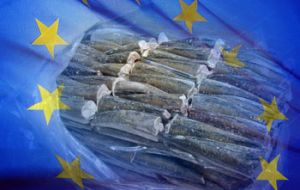MercoPress. South Atlantic News Agency
Brussels approves Uruguayan fish industry sanitary standards
 EU has determined that Uruguay meets 'adequate standards' for its seafood. (FIS)
EU has determined that Uruguay meets 'adequate standards' for its seafood. (FIS) The European Commission (EC) has ruled that the controls carried out by Uruguayan sanitary authorities guarantee the “adequate standards” demanded by Community norms for imported seafood products.
Inspectors from the European Veterinary Office visited the country last November to assess sanitary conditions of Uruguayan processing plants and seafood products exported to the European bloc.
The European Union (EU) experts detected “minor” deficiencies with respect to these requirements and thus recommended some measures to the Uruguayan authorities to correct them.
They also concluded that the Government of Uruguay did not set down certain regulations related to bivalve molluscs.
In 2008, Uruguay exported 12,250 tons of mostly frozen seafood products to the countries of the EU. The main exported species were hake, croaker, wreck fish and mako shark; and the main buyers of Uruguayan products were Italy, Spain, Germany and France.
Also, Uruguay imported 2,170 tons of seafood products, like salmon, shrimp and squid from Argentina, Chile and India.
In terms of molluscs, in 2008 the South-American country sent a total of 609 tonnes of frozen seafood products to Europe, namely to Spain, Italy, Holland and France.
Complications in exporting seafood produce to the European market began in 2007, when EU inspectors stated that certain protocols established by National Directorate of Aquatic Resources (DINARA) were not being applied in plants and fishing vessels.
The EC suspended the authorisations of three Uruguayan plants to export fish to the EU market, upon detecting breakdowns in sanitary conditions and verifying that certain reagents used to analyse samples had expired. (FIS)




Top Comments
Disclaimer & comment rulesCommenting for this story is now closed.
If you have a Facebook account, become a fan and comment on our Facebook Page!